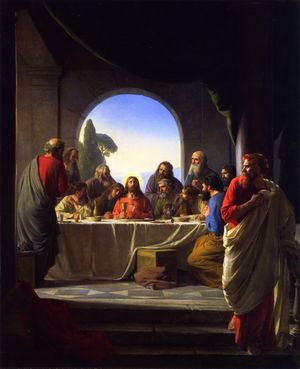Transubstantiation

The mystery of transubstantiation is the faith we hold that the wine and the bread served in the ritual of Holy Communion assume the vibration, the very essence of the body and blood, the Alpha and the Omega, of Jesus Christ. His full attainment is given to us, portion by portion, in the body and blood—in the bread and the wine.
The alchemy of transubstantiation
Saint Germain explains the meaning of the body and blood of Christ as it pertains to the statement of Holy Communion:
When Jesus made the statement “Except ye eat the flesh of the Son of man, and drink his blood, ye have no life in you,”[1] it was the setting forth of the ritual of the mystical union of the disciples with the Body and the Essence of the Christ, which was undoubtedly perfectly manifest in Jesus. The actual drinking of the blood and the eating of the flesh of Jesus is not the intent of this admonishment, nor is it the requirement of the Infinite Spirit whom Jesus called Father.
Participation in the ritual of holy communion whereby Christians have partaken of the Last Supper of the Lord with his disciples is the means whereby they may spiritually enter into the drinking of the blood and the eating of the flesh of Jesus. Through the alchemy of transubstantiation, the grape juice is charged with the essence, the very light of the Christ, and the bread assumes the frequency of his body consciousness. When the communicant partakes of the host, this charge and this frequency are transferred not only to his body but also to his mind and soul.
The term transubstantiation means the changing of substance. Actually, the juice and the bread are not visibly changed in their form into the flesh and blood of Jesus; but rather the Holy Spirit, who administers the communion through the minister or priest, focuses the energy spirals of Alpha (Spirit or life-essence) and Omega (the body consciousness) in the juice and the bread. Although the nonessential properties of the grape juice and the bread remain, such as taste, color, shape and smell, the essential properties are changed as the molecules of substance take on and are imbued with the Alpha and Omega spirals of the Holy Spirit.
This taking-in of the energies of wholeness through Holy Communion is a means whereby devotees of Christ may put on the life-essence and the body consciousness of their Lord as they approach the throne of grace step by step, initiation by initiation. Each time they call upon the law of forgiveness, invoke the violet transmuting flame and accept the purging fires of the Holy Spirit for the transmutation of past sins, they are preparing to partake of the Sacred Eucharist in each succeeding communion service.[2]
Transmutation and judgment
Transubstantiation means alchemy. It has been a mystery of the Church since the institution of the Last Supper by Jesus. Transubstantiation is not limited to a wafer and a cup of wine. It is the intent of Almighty God through his Son that this heart-energy should be the transubstantiation of the whole body of God upon earth. The light of Alpha and Omega is sufficient to transmute—a term synonymous with transubstantiation—all of the sins of the children of God, of the sons and daughters of God.
But the body and the blood of Jesus Christ will never atone for the seed of the wicked, the wicked one, or their wicked deeds. If it is partaken by them who are not of God, it becomes instantaneously within them the judgment. These great mysteries of the forgiveness of sins given unto God’s children but withheld from the seed of the wicked one are given by the ascended master Enoch.
See also
Sources
Elizabeth Clare Prophet, February 17, 1979.
- ↑ John 6:53.
- ↑ Mark L. Prophet and Elizabeth Clare Prophet, The Path of the Universal Christ, pp. 164–65.
